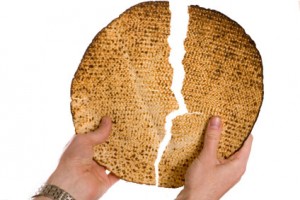
by Liz Lawler
The Passover Purge
 Are you gonna finish that? If you do, are you going to keep it down?
Are you gonna finish that? If you do, are you going to keep it down?
The Passover Purge has me thinking about bulimia and Jews. I hear the word “purge” and I go straight there. Koshering your kitchen for Passover is hard and thorough work. Under normal circumstances, this just marks a heightening of Jewish food awareness. It is a week of tip-toeing through grocery stores and restaurants, scanning ingredient lists for yeasty offenders. All of which is juxtaposed with the frantic Spring cleaning (the other day, my cleaning lady got three panicked phone calls in the span of two hours, from people trying to corner some help). At any rate, my train of thought went something like this: Passover, Jews, food, purging, neurosis, barfing = Jeworexia?
When I was converting, Jews kept telling me how every holiday is “ALL ABOUT FOOD, YAY!! You’ll love it, there’s food, there’s wine, and there are endless evenings around the table.” So: a mix of booze, food, ritual observance and family… Religious and familial drama unfolding in a place connected to nourishment–how can there not be a disproportionate number of Jewish women gagging up their food?
The dietary strictures governing Passover are important, valid. This week is an opportunity to reset your dietary clock, pull yourself out of the past year’s worth of habit. But bulimia takes this healthy and reasonable framework and perverts it, caricaturing the sacralisation of nourishment in the name of achieving some extreme feminine ideal, itself a perversion of healthy femininity. Anorexics and bulimics invent convoluted rituals to organize their disorders–chopping their food into tiny pieces, chewing bites to oblivion, pushing food around their plates in concentric circles to mimic the motions of real eating. Kashrut can provide a legitimizing framework for the obsessive cycles of disordered eating.
But let’s be clear: kashrut is not the cause or catalyst for an eating disorder. Women (largely) who develop a problem with food, do so for a variety of reasons, domestic or familial abuse, overbearing parents, anything that might give them a need to control, obsess over, or distort their diet to regain a sense of balance in the world. There is tremendous pressure for many young Orthodox (or not) women to attract and keep a suitable husband.
All of the available literature, both Jewish and non-Jewish, speaks of the problem in similar terms—it’s about control, it’s about family, it’s because of the fashion industry/secular American culture, it’s a perfectionist’s disease, and you will always struggle with this. There is little different or unique in the current analysis, and I doubt I have much to add. But it seems that a lot of these findings are broad and shallow, and in the final equation, we understand it in “disease model” terms, about as well as we understand alcoholism. Not well, that is.
We watch our loved ones wasting away; we grieve for them, while blaming them for something we feel should be easily controlled. The very absurdity of this illness should attest to the fact that this is a disease, ridiculously illogical, and all-consuming (no pun intended). The refusal involved does not come from a measured sense of restraint, or an accurate picture of one’s self. This refusal comes from grief, spite, fear, and a distorted sense of self-worth. It makes each meal a negotiation, a transaction. And denial often surrounds the victim. One problem that many therapists encounter when treating young Orthodox women, is that they have simply come to treatment too late. Their families have been in denial for so long, that they have long passed the tipping point, and usually have cause irreparable damage to themselves. But there are enough stories. Enough testimonials.
Judaism is non-dual, the world (physical, spiritual, etc) is a continuum; all is one (yin and yang, shiva/shakti—close to my own yogini heart that last one). So the physical and spiritual bodies are, in fact, one and the same. To starve one is to starve the other. The individual is fractured and dis-integrated by the illness. And along those lines, treating this set of disorders as shameful perversions, rather than legitimate illnesses, causes a social/cultural dis-integration. For Judaism to function as an organic whole, socially, culturally and politically, there needs to be a healing of this schism.
So look around. These women are hiding in plain sight. One of the strange dichotomies of this illness is that the less there is to see of her, the more visible the anorexic becomes. Like someone grotesquely obese, a bag of bones and veins draws attention.
If your girlfriend’s hair caught on fire, you would put it out, wouldn’t you? Or would you stand by and let her burn?
-Liz Lawler